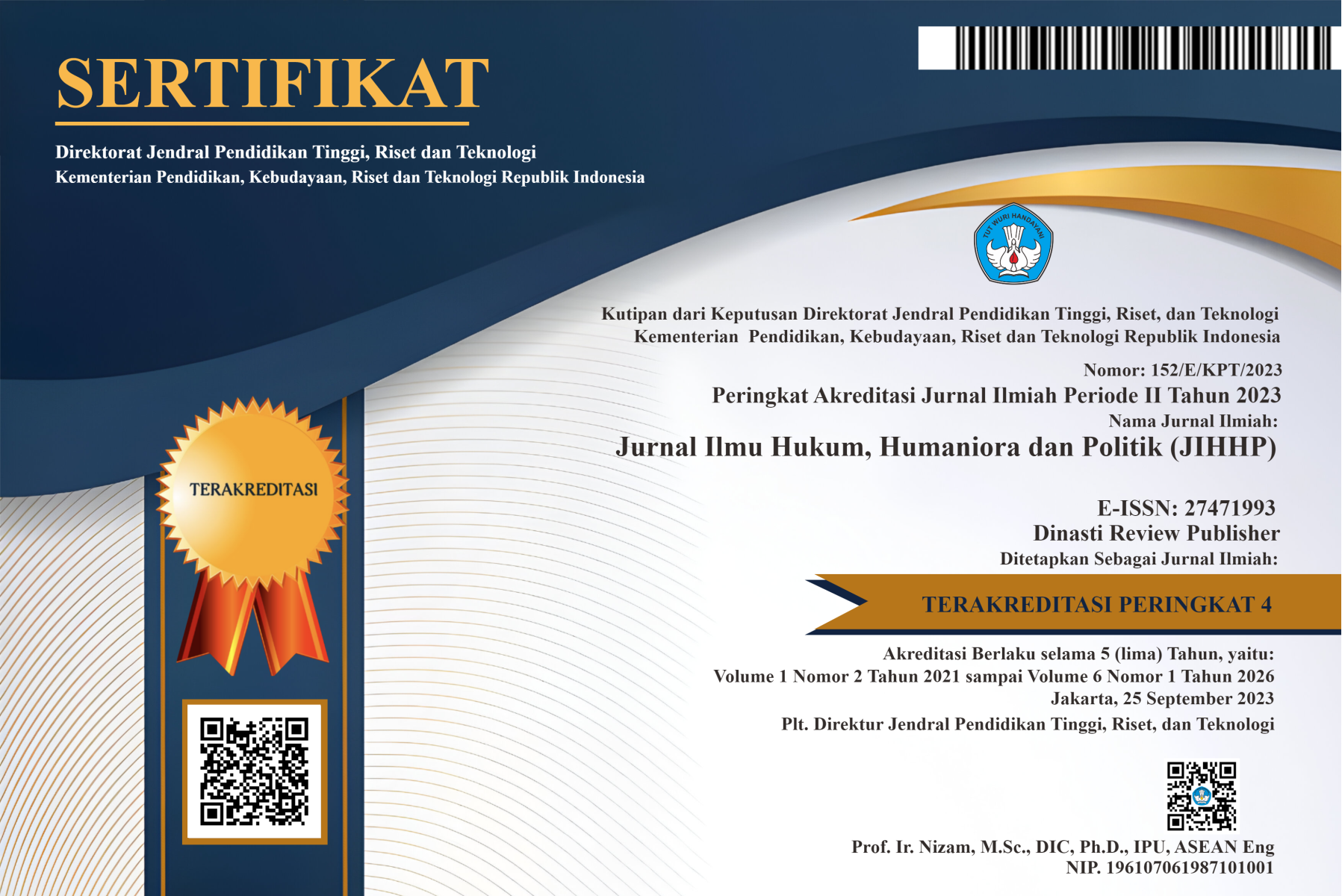Pertangungjawaban Pidana Pemegang Saham pada Tindak Pidana Korporasi dalam Undang-Undang Nomor 1 Tahun 2023 Tentang Kitab Undang-Undang Hukum Pidana (KUHP)
DOI:
https://doi.org/10.38035/jihhp.v4i5.2316Keywords:
Criminal Liability, Shareholders, Corporate CrimeAbstract
Corporations have a strategic role in bringing about change and growth in the world economy. Corporations are second only to the State in increasing economic growth and national development, but there are times when corporations also commit various criminal acts that harm the state and society. The damage to banking that occurred in the past was precisely due to the actions of the controlling shareholders of the banks, through the GMS placing people (minions) as members of the board of directors and commissioners. These people who were given strategic positions by the controlling shareholders were puppets of the controlling shareholders and carried out the policies of the controlling shareholders. The case of Bank Harapan Sentosa (BHS) shows how the shareholders had evil intentions by creating a "fictitious" corporation to apply for credit to the bank where the convicted person was the controlling shareholder. The corporate veil doctrine, which provides a veil of protection to shareholders, is considered to be a trigger for the repetition of criminal acts committed by corporations. Law Number 1 Year 2023 on the Criminal Code has been passed. Based on the provisions of Article 613 of the Criminal Code, every legislation, its criminal provisions must refer to Law Number 1 of 2023 concerning the Criminal Code. This research is a normative juridical research that uses a statutory approach, concept approach and case approach. This research uses primary, secondary and tertiary legal materials. The data collection technique used is through literature study where the data collected is grouped according to the problem and then analyzed qualitatively so that conclusions can be drawn. Based on the results of the research, it is known that all arrangements for errors in Law Number 1 of 2023 concerning the Criminal Code can be held accountable to the corporation. Law No. 1 of 2023 on the Criminal Code has regulated the imposition of criminal liability of corporations and shareholders. According to Law No. 1 of 2023 on the Criminal Code, there are 3 (three) roles of shareholders who can be held criminally liable, namely as a person who gives orders, a person who controls and as a beneficial owner of the corporation.
References
Amir, Ari Yusuf, Pidana Untuk Pemegang Saham Korporasi, Yogyakarta: Arrus Media, 2020.
Arief Barda Nawawi, Kapita Selekta Hukum Pidana, Bandung: Citra Aditya Bakti, 2013.
Ilyas Amir, Asas-Asas Hukum Pidana, Memahami Tindak Pidana dan Pertanggungjawaban Pidana Sebagai Syarat Pemidanaan, Yogyakarta: Rankang Education Yogyakarta & PuKAP-Indonesia, 2012.
Mertha I Ketut, Buku Ajar Hukum Pidana, Denpasar: Fakultas Hukum Udayana Denpasar, 2016.
Muladi dan Dwija Prayitno, Pertanggungjawaban Pidana Korporasi, Jakarta: Prenada Media Group, 2012, Edisi Ketiga.
Saleh, Roeslan, Pikiran-Pikiran Tentang Pertanggung Jawaban Pidana (Jakarta: Ghalia Indonesia, 1986.
Soekanto, Soerjono, Pengantar Penelitian Hukum Jakarta: Universitas Indonesia, 1986.
Syahrin Alvi, Ketentuan Pidana Korporasi Tentang Perlindungan dan Pengelolaan Lingkungan Hidup, Jakarta: Prenadamedia Group, 2019.
Heffinur, “Pertanggungjawaban Pidana Pemegang Saham dan Direksi Terhadap Korporasi yang dipidanakan”, Jurnal Refleksi Hukum, Vol. 8, No.2, 2014.
Juniar Afif, “Mencari Bentuk Pemidanaan Terhadap Pemegang Saham Korporasi dalam Tindak Pidana Lingkungan Hidup”, Jurnal PALAR (Pakuan Law Review), Volume 7 Nomor 2, 2021.
Kristian, “Urgensi Pertangungjawaban Pidana Korporasi”, Jurnal Hukum dan Pembangunan, Tahun ke-43,Oktober-Desember 2013.
Kurniawan, “Tanggungjawab Pemegang Saham Perseoran Terbatas Menurut Hukum Positif”, MIMBAR HUKUM ,Volume 26, Nomor 1, Februari 2014.
Sutra Hari dan Nyoman Serikat, “Pengaturan Perkembangan Korporasi Sebagai Subjek Hukum Pidana di Indonesia”, Jurnal Hukum Media Bhakti, Volume 3 Nomor 2, 2020.
Widiyono Try, “Perkembangan Teori Hukum dan Doktrin Hukum Pierching The Corporate Veil Dalam Undang-Undang PT dan Realitasnya Serta Prospektif Kedepannya”, A Lex Jurnalica, Volume 10, No. 1, April 2013.
Wijaksana Muhamad, “Pengaturan Korporasi Sebagai Subjek Tindak Pidana (esksistensi dan Prospeknya)”, Rech Vinding Media Pembinaan Hukum Nasional, ISSN 2089-9009, 2020.
Undang-Undang Nomor 1 Tahun 2023 tentang Kitab Undang-Undang Hukum Pidana (KUHP).
Undang-Undang Nomor 40 Tahun 2007 tentang Perseroan Terbatas.
Peraturan Mahkamah Agung Nomor 13 Tahun 2016 tentang Tata Cara Penanganan Perkara Tindak Pidana Oleh Korporasi.
Humas dan Protokol BPHN, “RUU KUHP Disahkan Menjadi Undang-Undang”, https://bphn.go.id/publikasi/berita/202212061210189/ruu-kuhp-disahkan- menjadi-undang-undang#, diakses tanggal 30 Desember 2022.
https://eprints.umm.ac.id/58131/3/BAB%20II.pdf, diakses tanggal 30 Maret 2023.
https://kbbi.web.id/saham.html, diakses tanggal 20 Mei 2023.
Downloads
Published
How to Cite
Issue
Section
License
Copyright (c) 2024 Rio Fransiscus Girsang, Alvi Syahrin, Edi Yunara, Rosmalinda Rosmalinda

This work is licensed under a Creative Commons Attribution 4.0 International License.
Hak cipta :
Penulis yang mempublikasikan manuskripnya di jurnal ini menyetujui ketentuan berikut:
- Hak cipta pada setiap artikel adalah milik penulis.
- Penulis mengakui bahwa Jurnal Ilmu Hukum, Humaniora dan Politik (JIHHP) berhak menjadi yang pertama menerbitkan dengan lisensi Creative Commons Attribution 4.0 International (Attribution 4.0 International CC BY 4.0) .
- Penulis dapat mengirimkan artikel secara terpisah, mengatur distribusi non-eksklusif manuskrip yang telah diterbitkan dalam jurnal ini ke versi lain (misalnya, dikirim ke repositori institusi penulis, publikasi ke dalam buku, dll.), dengan mengakui bahwa manuskrip telah diterbitkan pertama kali di JIHHP.















































